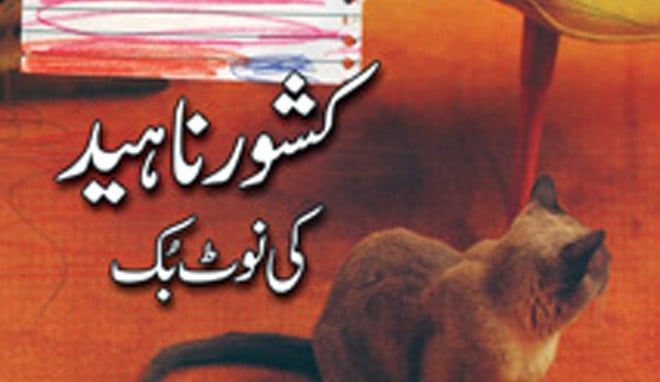

She decided to share with readers some more stuff from the counterfoils of her memory. Here she is at it again with Kishwar Naheed Ki Notebook. She needs no introduction; a writer of more than sixteen books on poetry, prose and some translation work, her literary output speaks for itself.
The present autobiographical slim book tells us what she had to undergo in her long literary as well as professional career. She thinks these insights might be of some value for the women. She starts off from the day she married Yusuf Kamran against the wishes of her parents. Life wasn’t easy at all as she fought on two fronts: home and office. She was wary of her ‘philandering’ husband which meant she had to run the house on her own.
She translated a famous book of French feminist writer Simone de Beauvoir Debouir in 1991 which she says was warmly received with five thousand copies sold out in a single month. We cannot confirm the claim however the fact remains that the book, published by Vanguard, ruffled many a feather; she was charged with obscenity and it was banned by the government. She was put in the lockup where she was "treated with tea and samosa".
Soon her friends came to her rescue and she was freed but the book was brushed under the carpet (pg 37).
Her other memoir Buri Aurat ki Katha was widely read and discussed too.
She remembers that when Ziaul Haq visited the army guest house at Risalpur, he ordered its renovation. Before its renovation, a painting that hung there showed the clash between Tipu Sultan and the British army. Tipu Sultan was lying on the ground injured in the painting while the British army was shown as the victor. The Khakis abhorred the painting that degraded their hero. A painter Masood Akhtar was hired who fulfilled their wish in another painting where Tipu Sultan was shown as defeating the British army.
There are many other such episodes that she had to witness during her career.
Apart from her professional life, she talks about her numerous foreign trips and the celebrities she had a chance to meet like Naguib Mahfouz, Rasul Gamzatov, Nawal El Saadawi, Noam Chomsky and many others. At times one feels this is the sole purpose of this book.
Autobiographical writing tends to satisfy one’s ego and gives the writer an opportunity to magnify his or her image. Apart from a few incidents, Kishwar Naheed falls short of what one might expect from her.
Like billions of people, she cherished the day Nelson Mandela was freed after long years of imprisonment. She wrote a poem about the grand event and sent the poem to Nelson Mandela through the good offices of the ambassador of South Africa whom she knew. Nelson Mandela sent her an appreciation letter along with flowers. So far so good except that the books narrates the same incident twice.
Naheed is a woman of no mean repute with a larger than life persona. She has made great contribution in many fields. But this book is like a hurried attempt that puts together her stray thoughts without any thread that knits or joins them. The book needs efficient editing so as to avoid repetition of facts.